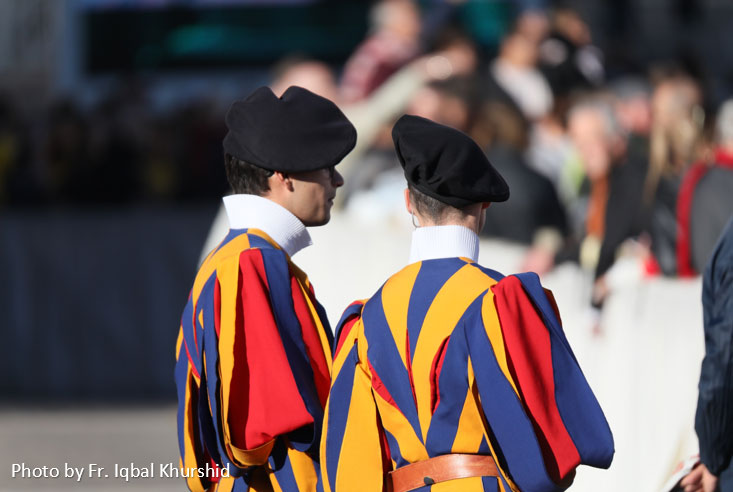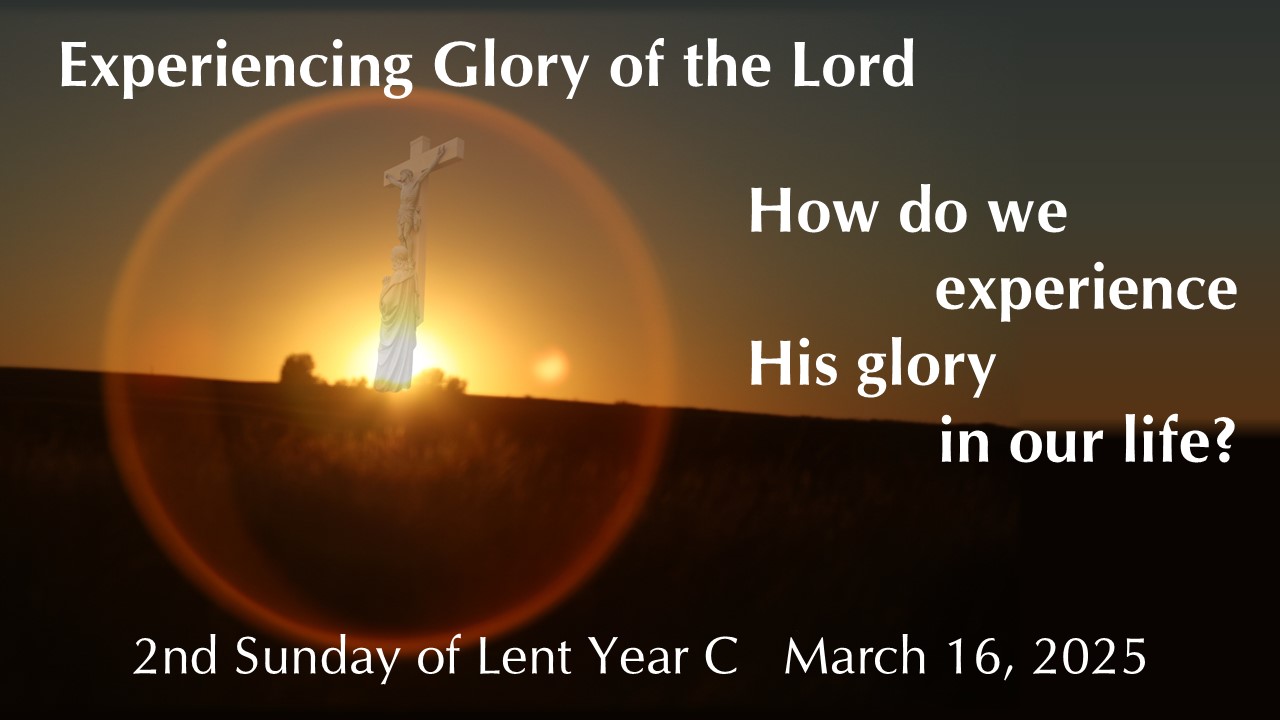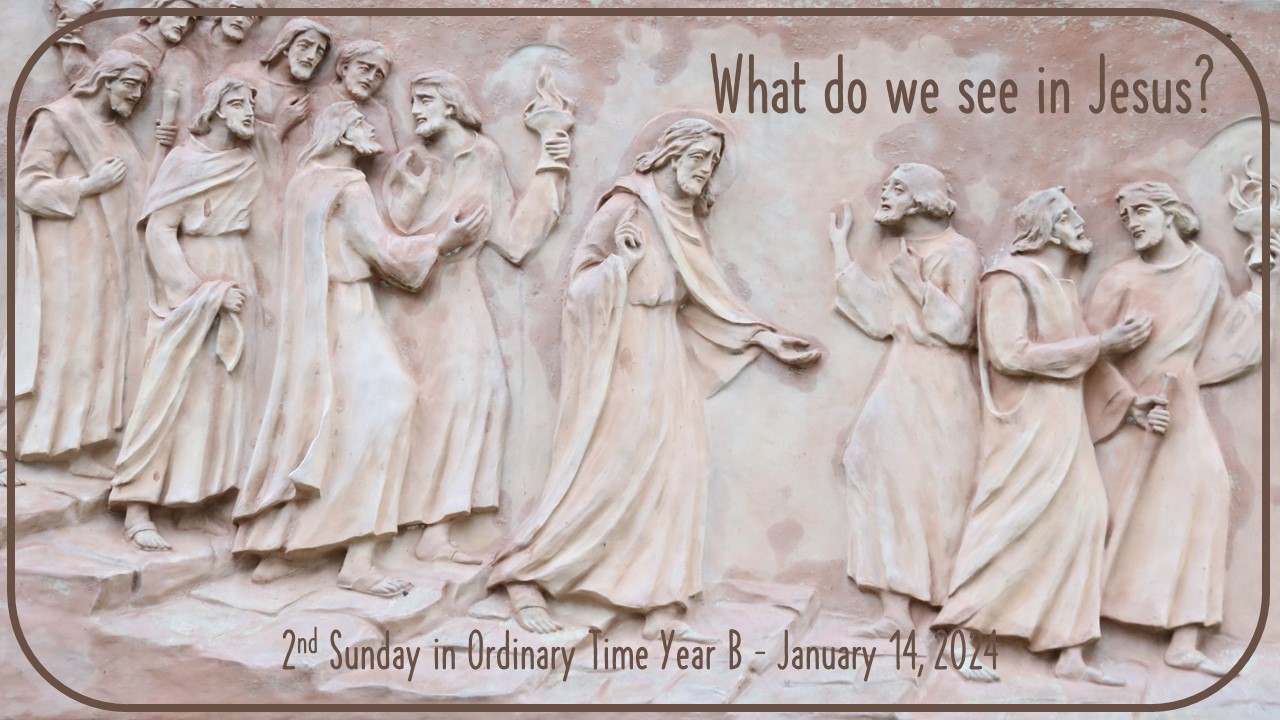
Be On Guard | November 28, 2021
1st Sunday of Advent – Year C
Today we begin our new liturgical year with Advent. Advent is the period of four Sundays and weeks before Christmas. Advent means ‘Coming’ in Latin (advenio) means “the coming.” Not “he came” but “the coming.” It has an idea of a constancy in it and not just arrival at one time and not at another. If we look at the whole Old Testament and we look at the readings, we can understand what this means.
During Advent we do not only wait in anticipation of Christmas; we are also called to rekindle the anticipation of the glorious return of Christ, when he will return at the end of time, preparing ourselves, with consistent and courageous choices, for the final encounter with him. We remember Christmas, we await the glorious return of Christ, and our personal encounter: the day in which the Lord will call. During these four weeks we are called to leave behind a resigned and routine way of life and to go forth, nourishing hope, nourishing dreams for a new future.
The First Coming, of course, is the coming of the child, the coming of the Saviour, the coming of Emmanuel, God with us, and he comes in Bethlehem, and this is an historical coming. But what makes this so much more important is the longing and the hope that the children of Israel brought down through the centuries, two thousand years, beginning with Abraham and all the way to when Joseph and Mary went to the little village, the little town of Bethlehem, the seat of King David of olden days, and there was born the child. The First Coming is God comes in weakness, God comes in the quiet of the night, God comes like a helpless child, in need of men and women to take care of him, to watch over him, to feed him, to do all these unbelievable things when you think that the Blessed Mother and Joseph are raising a child who is God Himself. And so, this coming is well worth all the effort we put in to celebrate.
It is the custom to kind of downplay the commercial side of Christmas, but everybody knows that seeing through the commercial side of Christmas is the gift of God, His Son, the gift of God who comes himself, weak, helpless and needy, that we might know that in the mystery of God there is a great yearning to experience the way that we experience, to feel the things that a human being feels and to become one with us. It is as if he comes all the way down from the highest of heaven and from now on, he has come and he has come to stay and he continues to be with us.
The Second Coming is more dramatic. The Second Coming is the end of the world. This is the coming of Jesus into the world. These four Sundays of Advent speaks about four Gospel values: Hope, Peace, Joy and Love. Each Sunday one candle is lit which symbolizes the light of Christ because Jesus is our Light and we need to walk in the light of Christ. The liturgical color during Advent is Purple which is the symbol of hope in the second coming of Christ and Repentance.
The season of Advent has two main parts: First two week will focus on the 2nd coming of Jesus and other two weeks will remind us about his first coming that how he was prophesied in the Bible and how his birth took place.
Once there was a very old couple who enjoyed their married life for almost 70 years with beautiful children, grand children, and great grand children. One fine night the husband decided to tell his wife one thing. So late that night, just before she fell asleep, he whispered it in her ear. She smiled – the kind of smile that makes him smile back –and she said, “Now I’m ninety-five and I think about my life and what it was like to be young, I hope that I can remember this very moment.” A few seconds later she closed her eyes and fell asleep. The room was peaceful – almost silent. All he could hear was the soft purr of her breathing. He stayed awake thinking about the time they had spent together and all the choices in their lives that made this moment possible. And at some point, he realized that it didn’t matter what they had done or where they had gone. Nor did the future hold any significance. All that mattered was the serenity of the moment.
Advent marks that time when darkness begins to grow weaker, and the sun becomes stronger. Advent is an invitation to break through the darkness into the light. It offers a challenge that comes to us very forcefully with a question: what darkness do we need to overcome? What darkness in our life and in our world would we like to see reversed?
The Readings of this First Sunday of Advent brings us together to the prepare ourselves to welcome the light which illumines our inner darkness and help others to enjoy the presence of the Lord. In the First Reading Prophet Jeremiah exclaims “The days are surely coming, says the Lord, I will fulfill the promise I made to the house of Israel and the house of Judah”. Isn’t it an amazing promise from God to prepare ourselves to welcome the Saviour of the World? God is going to walk with us to help us understand that we are being loved and protected. On our part we need to show the warmth of the same love to others but not to become cold.
There is a story of six people who froze to death around a campfire on a bitterly cold night. Each had a log of wood they might have contributed to the fire, but for reasons satisfactory to themselves, each person refused to give what they had. A woman would not give because she said she hated men. A homeless man would not give because there was a rich man in the group. The rich man would not give because he did not want to warm someone who was obviously shiftless, lazy, and drank. Another would not give up his log because he recognized someone not of his race or religious faith. And the fire died, as each person withheld their piece of fuel for reasons justifiable to themselves, and so, they all died. This story was originally told in a poem that ends with these tragic lines: six logs held fast in death’s still hand, were proof of human sin; they did not die from cold without, they died from cold within.
In the Second Reading St. Paul is awaking us to avoid from becoming cold but “May the Lord make you increase and abound in love for one another and for all….”. I believe the season of Advent is not only a season of hope and waiting but also season of warm greetings and welcome. The Author of Letter to Hebrews keeping reminding us with these words “Let mutual love continue. Do not neglect to show hospitality to strangers,
for by doing that some have entertained angels without knowing it. Remember those who are in prison, as though you were in prison with them; those who are being tortured, as though you yourselves were being tortured. Let marriage be held in honor by all and let the marriage bed be kept undefiled; for God will judge fornicators and adulterers. Keep your lives free from the love of money and be content with what you have; for he has said, “I will never leave you or forsake you.” So we can say with confidence, “The Lord is my helper; I will not be afraid. What can anyone do to me?”
In the Gospel of this Sunday, Jesus not only speaks about end time (Eschatology) but also warns us all with these words “Be on guard….”. What does it mean to be on guard? The Gospel reading goes in this very direction and puts us on guard against allowing ourselves to be oppressed by an egocentric lifestyle or by the crazy pace of our days. I believe the words of Jesus are hitting the nail on the right point as we could see how the world is turning up and down. People are leaving the faith and following what the world is offering them without realizing the harm or damage. St. Paul helps us all to be aware of the situation and protect ourselves; “Finally, be strong in the Lord and in the strength of his power. Put on the whole armor of God, so that you may be able to stand against the wiles of the devil. For our struggle is not against enemies of blood and flesh, but against the rulers, against the authorities, against the cosmic powers of this present darkness, against the spiritual forces of evil in the heavenly places. Therefore, take up the whole armor of God, so that you may be able to withstand on that evil day, and having done everything, to stand firm. Stand therefore, and fasten the belt of truth around your waist, and put on the breastplate of righteousness. As shoes for your feet put on whatever will make you ready to proclaim the gospel of peace. With all of these, take the shield of faith, with which you will be able to quench all the flaming arrows of the evil one. Take the helmet of salvation, and the sword of the Spirit, which is the word of God. Pray in the Spirit at all times in every prayer and supplication. To that end keep alert and always persevere in supplication for all the saints. Pray also for me, so that when I speak, a message may be given to me to make known with boldness the mystery of the gospel, for which I am an ambassador in chains. Pray that I may declare it boldly, as I must speak”.
The word “be on guard” is almost found in the Bible over 67 times and whenever we read these words, they prepare us from the coming trouble or storm. In the Book of Genesis Adam and Eve were told to “be on guard” but they didn’t listen, and the consequences weren’t good. However, Jesus keeps encouraging us to be on guard and never let our hearts be down with the worries and cares of the world. One of the tools to boost our spirit is to pray as Jesus says in the Gospel “Be alert at all times, praying that you may have strength to escape all these things that will take place, and to stand before the Son of God”. Holy Father Pope Francis reflecting on the Gospel says “To be mindful and to pray: this is how to live in the time between now and Christmas. To be mindful and to pray. Inner listlessness comes from always turning around ourselves and being blocked by our own life, with its problems, its joy, and suffering, but always turning
around ourselves. And this is wearying; this is dull, this closes us off to hope. Here lies the root of the lethargy and laziness that the Gospel speaks about. Advent invites us to a commitment to vigilance, looking beyond ourselves, expanding our mind and heart to open ourselves up to the needs of people, of brothers and sisters, and to the desire for a new world. It is the desire of many people tormented by hunger, by injustice and by war. It is the desire of the poor, the weak, the abandoned. This is a favourable time to open our hearts, to ask ourselves concrete questions about how and for whom we expend our lives”.
The second attitude to best experience the time of awaiting the Lord is “Arise, “look up and raise your heads, because your redemption is drawing near”. It is about standing up and praying, turning our thoughts and our hearts to Jesus who is about to come. One stands when awaiting something or someone. We await Jesus and we wish to await him in prayer which is closely linked to vigilance. Praying, awaiting Jesus, opening oneself to others, being mindful, not withdrawn in ourselves. But if we think of Christmas in the light of consumerism, of seeing what I can buy to do this and that, of a worldly celebration, Jesus will pass by, and we will not find him. We await Jesus and we wish to await him in prayer which is closely linked to vigilance.
Let us “be on guard” against all the forces which are preventing us to keep Christ in our lives so that we may continue to experience his presence and love in our lives. Come Lord Jesus and dwell in our hearts. Amen
Once upon a time, an Enlightenment Being was born into a rich and powerful family. When he grew up, he became dissatisfied with the ordinary pleasures of the world and so gave up his former lifestyle, including his wealth and position. He went to the foothills of the Himalayas to become a holy man in the search for enlightenment.
One fine day in question our holy man ran out of salt. He decided to go and collect alms, while walking he came upon a caravan of people and horses and decided to join with it for part of his journey. In the evening they all stopped and made camp.
The holy man began walking by the foot of a big nearby tree. He concentrated his mind into meditation until he entered a high mental state. He remained in that state throughout the night, while continuing to walk.
Meanwhile, bandits meaning to do no good surrounded the campsite. They had waited until after supper when everyone had settled down for the night. But before they could attack, they noticed the holy man. They said to each other, “That man must be the guard for security. If he sees us, he’ll warn the rest. So, let’s wait until he falls asleep, and then do our robbing and looting!”
What the bandits didn’t know was that the holy man was so deep in meditation that he didn’t notice them at all — or anything else for that matter! So, they kept waiting for him to fall asleep. And he just kept walking and walking and walking — until the light of dawn finally began to appear. Only then was he finished meditating.
Having had no chance to rob the caravan, the bandits threw down their weapons in frustration. They shouted, “Hey you in the caravan! If your security guard hadn’t stayed up all night, walking under that tree, we would have robbed you all! You should reward him well!” With that they left in search of someone else to rob.
When it became light the people in the caravan saw the clubs and stones left behind by the bandits. Trembling with fear, they went over to the holy man. They greeted him respectfully and asked if he had seen the bandits. “Yes, this morning I did,” he said.
“Weren’t you scared?” they asked. “No,” said the Enlightenment Being, “the sight of bandits is only frightening to the rich. But I’m not a rich man. I own nothing of any value to robbers. So why should I be afraid of them? I have no anxiety in a village, and no fear in the forest. Possessing only loving-kindness and compassion, I follow the straight path leading to Truth.”
In this manner he preached the way of fearlessness to the lucky people of the caravan. His words made them feel peaceful, and they honored him.
After a long life developing the Four Heavenly States of Mind, he died and was reborn in a high heaven world.
Other Sermons In This Series
8th Sunday in Ordinary Time Year C – February 27, 2022
February 25, 2022

2nd SUNDAY OF LENT – YEAR C ~ MARCH 16, 2025
March 13, 2025

2nd Sunday in Ordinary Time Year B ~ January 14, 2024
January 11, 2024

